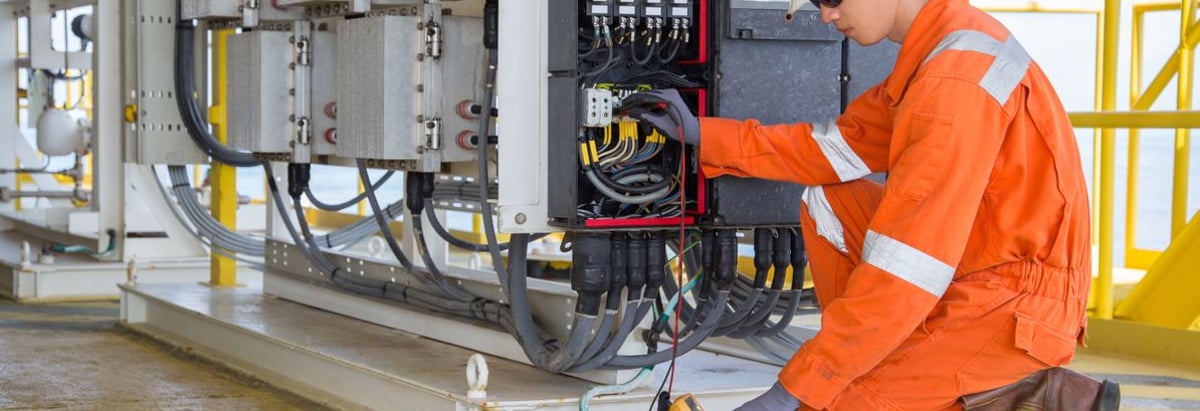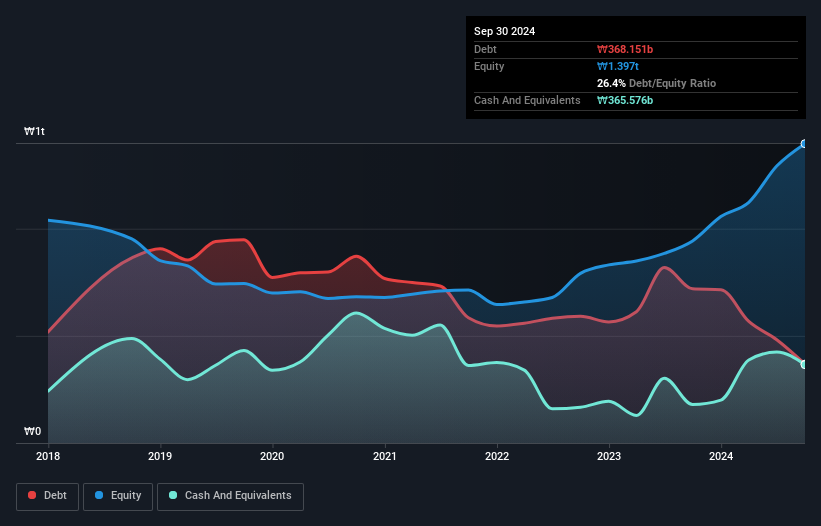
The external fund manager backed by Berkshire Hathaway's Charlie Munger, Li Lu, makes no bones about it when he says 'The biggest investment risk is not the volatility of prices, but whether you will suffer a permanent loss of capital.' When we think about how risky a company is, we always like to look at its use of debt, since debt overload can lead to ruin. We can see that HD Hyundai Electric Co., Ltd. (KRX:267260) does use debt in its business. But is this debt a concern to shareholders?
What Risk Does Debt Bring?
Generally speaking, debt only becomes a real problem when a company can't easily pay it off, either by raising capital or with its own cash flow. If things get really bad, the lenders can take control of the business. However, a more usual (but still expensive) situation is where a company must dilute shareholders at a cheap share price simply to get debt under control. Of course, the upside of debt is that it often represents cheap capital, especially when it replaces dilution in a company with the ability to reinvest at high rates of return. When we think about a company's use of debt, we first look at cash and debt together.
See our latest analysis for HD Hyundai Electric
What Is HD Hyundai Electric's Net Debt?
You can click the graphic below for the historical numbers, but it shows that HD Hyundai Electric had ₩368.2b of debt in September 2024, down from ₩719.5b, one year before. However, because it has a cash reserve of ₩365.6b, its net debt is less, at about ₩2.57b.

A Look At HD Hyundai Electric's Liabilities
Zooming in on the latest balance sheet data, we can see that HD Hyundai Electric had liabilities of ₩1.64t due within 12 months and liabilities of ₩317.3b due beyond that. On the other hand, it had cash of ₩365.6b and ₩840.6b worth of receivables due within a year. So its liabilities outweigh the sum of its cash and (near-term) receivables by ₩749.4b.
Given HD Hyundai Electric has a humongous market capitalization of ₩15t, it's hard to believe these liabilities pose much threat. But there are sufficient liabilities that we would certainly recommend shareholders continue to monitor the balance sheet, going forward. Carrying virtually no net debt, HD Hyundai Electric has a very light debt load indeed.
We measure a company's debt load relative to its earnings power by looking at its net debt divided by its earnings before interest, tax, depreciation, and amortization (EBITDA) and by calculating how easily its earnings before interest and tax (EBIT) cover its interest expense (interest cover). The advantage of this approach is that we take into account both the absolute quantum of debt (with net debt to EBITDA) and the actual interest expenses associated with that debt (with its interest cover ratio).
HD Hyundai Electric has very little debt (net of cash), and boasts a debt to EBITDA ratio of 0.0037 and EBIT of 26.5 times the interest expense. So relative to past earnings, the debt load seems trivial. Even more impressive was the fact that HD Hyundai Electric grew its EBIT by 162% over twelve months. That boost will make it even easier to pay down debt going forward. There's no doubt that we learn most about debt from the balance sheet. But ultimately the future profitability of the business will decide if HD Hyundai Electric can strengthen its balance sheet over time. So if you want to see what the professionals think, you might find this free report on analyst profit forecasts to be interesting.
Finally, a business needs free cash flow to pay off debt; accounting profits just don't cut it. So it's worth checking how much of that EBIT is backed by free cash flow. In the last three years, HD Hyundai Electric's free cash flow amounted to 38% of its EBIT, less than we'd expect. That's not great, when it comes to paying down debt.
Our View
The good news is that HD Hyundai Electric's demonstrated ability to cover its interest expense with its EBIT delights us like a fluffy puppy does a toddler. But truth be told we feel its conversion of EBIT to free cash flow does undermine this impression a bit. Zooming out, HD Hyundai Electric seems to use debt quite reasonably; and that gets the nod from us. After all, sensible leverage can boost returns on equity. Over time, share prices tend to follow earnings per share, so if you're interested in HD Hyundai Electric, you may well want to click here to check an interactive graph of its earnings per share history.
Of course, if you're the type of investor who prefers buying stocks without the burden of debt, then don't hesitate to discover our exclusive list of net cash growth stocks, today.
Valuation is complex, but we're here to simplify it.
Discover if HD Hyundai Electric might be undervalued or overvalued with our detailed analysis, featuring fair value estimates, potential risks, dividends, insider trades, and its financial condition.
Access Free AnalysisHave feedback on this article? Concerned about the content? Get in touch with us directly. Alternatively, email editorial-team (at) simplywallst.com.
This article by Simply Wall St is general in nature. We provide commentary based on historical data and analyst forecasts only using an unbiased methodology and our articles are not intended to be financial advice. It does not constitute a recommendation to buy or sell any stock, and does not take account of your objectives, or your financial situation. We aim to bring you long-term focused analysis driven by fundamental data. Note that our analysis may not factor in the latest price-sensitive company announcements or qualitative material. Simply Wall St has no position in any stocks mentioned.
About KOSE:A267260
HD Hyundai Electric
Manufactures and sells electrical equipment in South Korea.
Outstanding track record with flawless balance sheet.
Similar Companies
Market Insights
Community Narratives




